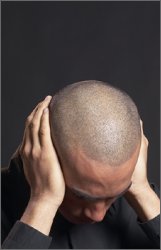LISTEN UP!
Exposure to Loud Noise May Cause Tumor & Other Health Risks
by www.SixWise.com
Bob Seger, Jeff Beck, Sting, Eric Clapton, Peter Frampton
and Bob Dylan all have something in common. Their years of
hard rocking have left a mark on more than just their fans
-- after years of exposure to loud noise, they all now have
hearing impairments.
But these hard rockers are not alone. Exposure to excessive
noise is, in fact, the most common cause of hearing loss and
the most common work-related disease.
|

About 25 percent of people listen to headphones at
levels that could harm their hearing, according to an
Australian survey.
|
Some 10 million Americans already have permanently damaged
hearing from loud noise. Another 30 million are at risk right
now in their homes, workplace and recreational settings, according
to the National Institute on Deafness and Other Communication
Disorders (NIDCD).
Surprisingly, though, hearing loss is only one health risk
that arises from loud noise exposure. There are several other,
serious, risks as well.
According to Eddie Chandler, a stress management specialist,
" ... Sounds can literally make you sick. Noise pollution
can increase your stress levels and create severe tension
in your daily life. It can increase your heart rate, raise
your blood pressure and even result in insomnia."
Acoustic Neuroma Tumor
A study to be published in the February 2006 Journal of Epidemiology
found that several years of repeated exposure to loud noise
increases the risk of developing a non-cancerous tumor that
could cause hearing loss.
People exposed to loud noise were 1.5 times more likely to
develop the tumor, called acoustic neuroma, than people who
weren't exposed to loud noise on a regular basis.
The slow-growing tumor gradually presses the cranial nerve
that senses sound and helps with balance. Symptoms, which
typically become noticeable at age 50 or older, include hearing
loss and ringing in the ears (tinnitus).
Noise Increases Heart Attack Risk
|

Heavy traffic, a typical nightclub and loud music are
all noisy enough to damage your health.
|
Prolonged exposure to high noise levels also increases the
risk of a heart attack, according to a study published in
the European Heart Journal.
The study involved 4,000 people who had been admitted to
Berlin hospitals from 1998 to 2001. When it came to environmental
noise (heavy traffic, machines like lawn mowers, yelling kids
and barking dogs), it was found that:
"We feel that, if you have a higher and longer exposure
to noise, either environmental or workplace noise, you are
at a higher risk for a heart attack," said lead investigator
Dr. Stefan Willich.
Risk of High Blood Pressure Goes Up
Another study by University of Michigan researchers, published
in the Archives of Environmental Health, found that working
in a loud environment raises blood pressure levels.
They outfitted workers at a Midwest auto-assembly plant with
monitors to take blood pressure readings and record noise
levels throughout the day.
It was found that while blood pressure was affected by overall
noise exposure, peaks in noise affected heart rate. Also,
an increase of 10 decibels in average noise exposure resulted
in a systolic blood pressure increase of 2 millimeters.
To put things in perspective, reducing systolic blood pressure
by 6 millimeters (for the long-term) has been associated with
a 35 percent to 40 percent reduction in strokes and a 20 percent
to 25 percent drop in coronary disease.
Where is All This Loud Noise Coming From?
Noise from all over -- work, traffic, music, TVs, industry,
people and more -- exists like never before. As a result,
much of the population is now experiencing related hearing
loss and other problems.
"There's no question that baby boomers have been exposed
to different sources of noise than any generation before them,"
says Dr. James F. Battey Jr., director of NIDCD. "We're
certainly seeing people in their 40s and 50s who notice their
hearing is not as good as it used to be."
Younger people are also at risk of future problems, as exposure
to noise via earbuds or headphones attached to MP3 players
and other media devices is common.
Many people may not even realize that they are listening
to music at harmful levels. An April 2005 study by National
Acoustics Laboratories in Australia, published in the International
Journal of Audiology, found that 25 percent of people wearing
headphones who were stopped on city streets were listening
at damaging volumes.
"Safe" Noise Levels
A safe average of noise for a 24-hour day is 70 dB, according
to the U.S. Environmental Protection Agency. Any
noise that reaches 85 dB or more can damage your hearing,
but even a softer noise can harm your health if it keeps you
up at night (a 45-dB noise is loud enough to keep the average
person awake) or irritates you.
To put things into perspective, here's a list of some common
noise measurements:
-
Quiet home: 20 dB
-
Normal talking: 40 dB
-
Ringing telephone: 60 dB
-
Air conditioner: 75 dB
-
Heavy traffic: 90 dB
-
Subway train, honking horns, jack hammers: About 100
dB
-
Typical nightclub: 110 dB
-
Ears register pain: 120 dB
-
Loud music, jet take-off: About 120 dB
Noise-Reducing Tips
|
Relieve Noise-Related Stress with The Pure Relaxation
CD: Guided Meditations for Body, Mind & Spirit
 This
is the #1 relaxation CD on the market today ... at
an incredible price! This
is the #1 relaxation CD on the market today ... at
an incredible price!
The Pure Relaxation CD will calm your mind, soothe
your emotions and create a state of deep relaxation
in your body. Using these guided meditations regularly
will help you to live in a more relaxed way. You will
notice when you are becoming tense and start to relax
spontaneously.
You will be amazed with how, by regularly listening
to the CD, it has a powerful ability to help you
relax and deal more effectively with stress throughout
the day, every day.
"You are creating an oasis in a very noisy,
busy world!" -- Pat Foth, Retired Pet Store Owner,
MI
Order
The Pure Relaxation CD Now and For a Limited Time: GET
FREE Shipping Anywhere in the World!
|
To keep noise to a minimum in your home, or to protect your
hearing if you must be in a noisy environment, try these tips
from the previous Sixwise.com article "Noise
Pollution: How Bad is it, How Bad Could it Get, What are the
Effects?":
-
Wear earplugs in noisy places
-
Turn down the volume on radios, personal headsets and
TVs
-
Try muting your TV during the commercials, or leaving
it off all together and reading a book instead
-
Sound-treat your home by putting heavy curtains on windows,
rugs on the floors and sealing all air leaks
-
Consider adding acoustical tile to your ceilings and
walls
-
Put on some light music, like the Pure
Relaxation CD, to buffer outside noise that you can't
control
-
Use sound-blocking headphones to listen to music/TV without
the disturbance of outside noises, and without disturbing
those around you
-
Look for quieter home appliances
-
Take a drive in a rural area to escape city noise for
a day
Recommended Reading
Noise
Pollution: How Bad is it, How Bad Could it Get, What are the
Effects?
27
"Never Events": They're Not Supposed to Happen,
but They Often Do
Sources
Turn
Down That Radio! Years of Loud Noise may Cause Tumor
Noise
at Work, Home may be Killing You
Researchers
See Link Between Loud Noise and Blood Pressure
Life's
Loud Noises Leave a Generation Struggling to Hear
American
Hearing Research Foundation